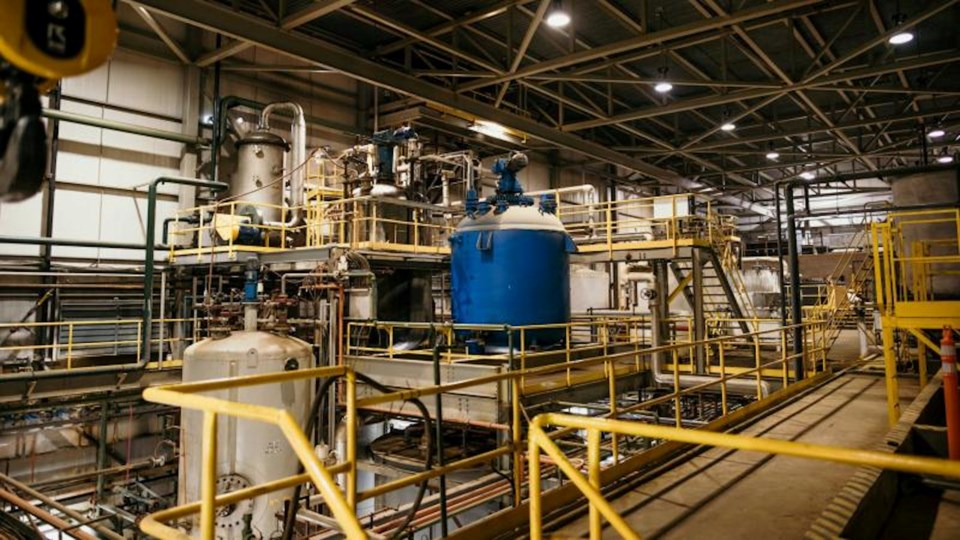Electra Battery Materials, the developers of a Temiskaming cobalt refinery, have come out with a financing package to finish construction of the plant and kick-start the development of a battery recycling operation.
The Toronto company’s new joint venture Indigenous partner, the Three Fires Group, is tentatively prepared to invest $10 million or half as part of a total $20-million arrangement for this venture, according to an Electra spokesperson.
A June 26 news release from Electra said the “commitment for a strategic investment” by Three Fires in this venture will be reviewed by shareholders of Three Fires. Talks are ongoing with the federal and provincial governments and other potential funders to advance progress of the refinery project.
Electra is well into construction of cobalt and nickel refining complex at the site of the former Yukon refinery located between town of Cobalt and Temiskaming Shores in northeastern Ontario.
But activity at the site has drawn due off due to inflation and global supply chain issues, forcing the company into cash conservation mode. Electra launched a strategic review process in May to find a deep-pocketed development partner.
A recycling operation will provide Electra with some upfront cash to help finish the refinery.
Electra announced a month ago that Three Fires had come aboard to establish a joint venture arrangement on the critical minerals recycling and help set up the front end of the supply chain.
With Volkswagen, LG-Stellantis, Toyota and GM Cami setting up electric vehicle and battery cell plants in southwestern Ontario, an estimated 30 tonnes of EV battery manufacturing waste will be generated every day, according to the Three Fires Group.
It represents an opportunity to keep that waste out of the landfill and recover all the valuable material for recycling.
Three Fires’ role in this partnership with Electra is to help them source the waste from battery cell manufacturers, electric vehicle makers and energy storage systems. They would set up a warehouse and shredding plant at a yet-to-be named site in southwestern Ontario where aluminum, copper and plastics would be recycled.
The price tag to build a southwestern Ontario battery shredding plant will be in the neighbourhood of $30 million.
Once operating, the rest of this minerally-enriched ‘black mass’ material would be shipped north to the Temiskaming for secondary processing where Electra has developed its own proprietary hydrometallurgical process to recover lithium, nickel, cobalt, manganese, and graphite..
For months, Electra has been lauding the success of its black mass recycling trials in Temiskaming. The company wants to expand the pilot recycling operation into a scalable 2,500-tonne per year facility that would grow with market demand for recycled critical minerals.
This investment from Three Fires would be facilitated by a non-brokered private placement of common shares of Electra. Three Fires would purchase them and Electra will grant them to right to nominate two members to Electra’s board.
“We see this strategic relationship as an opportunity to position Electra as a platform for greater participation by First Nations in the transition to a low-carbon economy, particularly relating to lithium-ion battery recycling,” said Electra CEO Trent Mell in a statement. “This would include participation at the board level and all levels of the organization, ensuring that Electra’s business strategy and ESG practices are aligned with the values and priorities of Canada’s First Nations.”
"The region has announced billions of dollars of government and corporate investments in the past 10 months, but no announcements yet on how the critical end of life cycle portion of the value chain will be treated," commented Phil Lee, CEO of Three Fires.
“What we desperately need is a clear plan to recycle the estimated 30 tonnes per day of EV battery manufacturing waste that is expected to be generated on our traditional lands. The Ministry of the Environment, Conservation and Parks estimates that all existing landfill capacity in the province will be exhausted in the next nine to 12 years," Lee said.
“We are confident that our joint venture with Electra will provide a turn-key solution that is mutually beneficial for Canada, the Province of Ontario, First Nations, and industry partners such as VW and LG-Stellantis.




